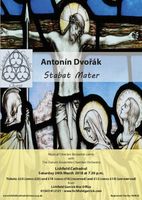Stabat Mater ()
Antonin Dvořák’s Stabat Mater, his first work on a religious theme and perhaps one of the most underrated masterpieces of the 19th century, was written in 1876–77 as the composer’s response to the death of his daughter, Josefa. The work focuses upon the Easter suffering of Mary at the foot of the cross, but reaches out to all humankind as a powerful exploration in music of the themes of grief and faith.
In this concert, on the weekend before Holy Week, Lichfield Cathedral Chorus, under its Musical Director Ben Lamb, is joined by the musicians of the Darwin Ensemble Chamber Orchestra and soloists in a performance of this deeply moving work in the glorious setting of Lichfield Cathedral.
In a change to the programme, we are privileged to welcome the talented Hanna-Liisa Kirchin, stepping in as our mezzo-soprano soloist.
We sang:
- Stabat Mater (1877) — Dvořák
Venue
Lichfield Cathedral, The Close, Lichfield, WS13 7LD [map]
« Carol concert (Dec 2017) ‖ Parry Choral Works (Jun 2018) »
Reviews
Stabat Mater
An uplifting and passionate performance of this monumental setting of the Stabat Mater under the baton of Ben Lamb was given at Lichfield Cathedral last Saturday. Falling on the reflective Marian ‘Feast of the sorrows’ when the text is most appropriate, it created both a spiritual and musical feast of solemn beauty which spun an ethereal web of mystery and passion around the building.
Dvořák’s setting was completed in 1877 and first performed in England in 1882. Dvořák begins his expression of Mary’s thoughts standing at the foot of the cross with an expansive stabat mater dolorosa section. In this performance the Darwin Ensemble chamber orchestra gave a moving performance in the controlled open section with the horn and flute weeping figuration rising in a crescendo to support the choral entry of the Lichfield Cathedral Chorus. Lamb instantly galvanised the chorus and their passionate singing supported by the orchestra created a powerful opening to the performance.
It was a real pleasure to hear the Lichfield Cathedral Chorus in full voice and as the performance progressed there were some magnificent moments, particularly the lilting tui nati section, the strong well-blended sound in the block homophony of fac me tecum in the virgo virginum, real presence in the punchy fac, ut tecum figure in the subliminal eja mater and a magnificent final Amen section of quando corpus morietor. The eja mater text is always associated with Pergolesi’s setting in my mind but Dvořák’s almost Schubertian sounding opening, somehow reminiscent of the sorrowful harmony of Gute Nacht in the Winterreise was exquisite and Phillip Lancaster’s sound on luceam celestial and luminescent, most appropriate. Lamb supported the woodwind and timpanist with great skill who showed beautiful and gentle control in this movement.
We were fortunate for the evening to have Hanna-Liisa Kirchin deputise for the mezzo soprano soloist. She gave a rich sonorous performance of the mezzo-soprano solos, most particularly in the inflammatus et accensus. Gillian Rae-Walker gave a consistently high quality soprano performance throughout showing a stunning high range soaring to B♭ in the fac ut portem duet. Edward Rimmer, as tenor, had an expressive tone which really shone in the fac me vere where his floating high tenor sound was allowed to drift over the orchestra and chorus with Lamb’s masterful control.
It was encouraging in this performance in general to see younger members singing with the Lichfield Cathedral Chorus to aid the opening of new experiences to this generation led by more experienced choral singers. I left this evening feeling that the Dvořák Stabat Mater should be more widely performed as it was an illuminating and exhilarating experience to hear this work on the eve of Palm Sunday. I will be looking forward to the next performances from the Lichfield Cathedral Chorus and Darwin Ensemble Chamber Orchestra who come highly recommended.
Laura Borenstein, March 2018
